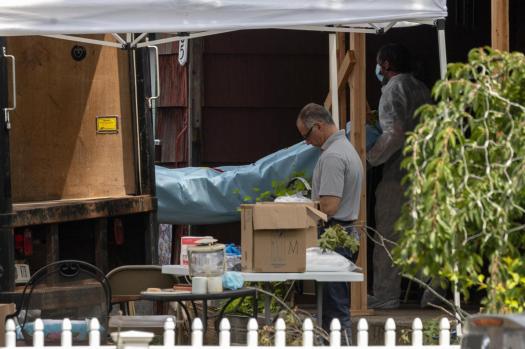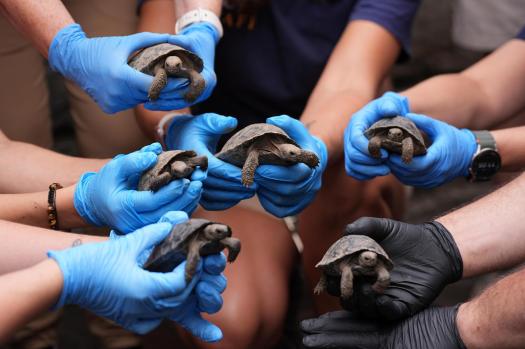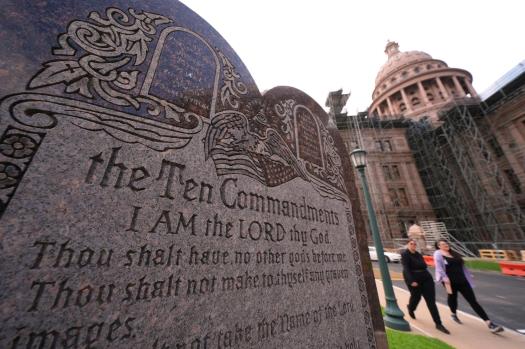According to Amanda Hernández of Stateline.org,
State and local crime laboratories around the nation are overflowing with evidence.
Delays in forensic testing, involving rape kits, drug samples, and blood vials, are delaying prosecutions, extending court dates, and requiring difficult decisions about what should and shouldn’t be analyzed.
State and local crime laboratories may now experience severe federal funding cuts as the demand for forensic testing increases. This could further postpone victim justice, sabotage criminal investigations, and strain already overburdened institutions.
There is a threat to two important federal grant programs that assist state and local forensic labs: Despite rising demand, one is funded below its authorized cap, while the other is subject to a significant decrease.
Some labs rely significantly on these government subsidies to keep up with growing caseloads, according to crime lab directors and forensic experts, who are concerned about the proposed reduction.
According to Scott Hummel, president of the American Society of Crime Laboratory Directors, a nationwide nonprofit professional organization, it would have disastrous effects on many crime laboratories that rely on those monies to keep running.
According to Hummel, who also serves as a quality assurance manager at the Kansas City Police Crime Laboratory in Missouri, backlogs will occur if those resources are further restricted. Labs are forced to make tough choices about how to prioritize their casework since those backlogs are becoming bigger.
Although they are sometimes hidden from the public, crime labs are crucial to criminal investigations. From rape cases to gun killings, they match ballistics, test DNA, examine drug samples, and validate evidence. Although the evidence may result in arrests, it also plays a crucial role in court proceedings, influencing the decisions made by prosecutors, defense lawyers, defendants, and victims.
However, many labs lack the experts, resources, and money necessary to stay up to date as a result of years of underinvestment. The demand for DNA testing has increased significantly along with the advancement of forensic technology, particularly in digital evidence.
According to Hummel, there is a growing expectation that labs will be able to perform more than they are capable of as technology advances.
At the same time, already overburdened labs are under further demand due to new state regulations and testing requirements. Toxicology and drug analysis requests have increased in some jurisdictions as a result of modifications to drug legislation, such as tighter DUI standards or renewed marijuana crackdowns. Other states, frequently without additional budget, have increased the standards for required evidence testing.
According to some lab directors who talked to Stateline, when resources can’t keep up with demand, even well-meaning policies can lead to bottlenecks.
Related Articles
-
Judge considers whether Alligator Alcatraz challenge was filed in wrong venue
-
Fans toast Grateful Dead s 60th with concerts at San Francisco s Golden Gate Park
-
Top Dems propose $20 raise over two years to resolve lawyer work stoppage
-
Officials work to unravel how and why gunman carried out deadly attack on NYC office building
-
Trump administration freezes $108M at Duke amid inquiry into alleged racial discrimination
“Policymakers should understand that the criminal justice system is putting more demands on us and that we need the resources to meet those demands,” stated James Carroll, director of the Los Angeles County Sheriff’s Department’s crime laboratory.
Another issue is low income; some analysts choose to work in the private sector, where they can earn more money and enjoy better benefits. It might take months or even years to train new analysts, which makes it challenging to retain experienced employees and fill important roles promptly.
We must be flawless, and if you have something that isn’t, it may damage your career, said Mike Lyttle, assistant director of the Tennessee Bureau of Investigation’s forensic services branch. It is a great deal of pressure.
However, that pressure can have a price, particularly if analysts are the ones who are subjected to it.
According to lab managers and directors who spoke with Stateline, overworking employees is dangerous in addition to being improper. It may result in faked results or quality problems like dry labbing, which could raise doubts about hundreds or even thousands of instances.
Some state and local governments are reconsidering the funding and organizational structure of their crime labs as delays increase nationwide.
A number of new laws have been passed in Colorado to create a review board and manage backlogs as officials deal with the fallout from a significant DNA testing scandal involving state-run labs. A bill that would have transferred control of Rhode Island’s state crime lab to the state attorney general’s office was debated by lawmakers earlier this year, but it was put on hold for additional research.
A new $1.5 million investment in Shelby County, Tennessee, will support the first local lab in the area dedicated to weapons ballistics, digital forensics, and quick DNA analysis. In order to give Memphis-area cases priority, Memphis City Council leaders are also trying to fund at least two new posts at a state laboratory.
Backlogs in forensic evidence have been brought to light in part by the nationwide rush to evaluate sexual assault kits. However, it has also compelled some labs to make difficult decisions regarding what is tested first.
For instance, the director of the state police forensic science division in Oregon, Brian Medlock, declared in January that the state lab had stopped analyzing DNA from any evidence related to property crimes. Until the backlog of sexual assault kits is cleared—a target the agency doesn’t anticipate achieving until the end of the year—testing won’t start up again. According to the state sdashboard, 474 sexual assault kits were still pending testing as of June.
Similar to Oregon, the Tennessee Bureau of Investigation is working through its backlog of rape kits by deprioritizing nonviolent cases. According to Lyttle, the organization can only handle a certain number of cases because it presently has six forensic biology analysts in training throughout the state.
He stated that while processing lower-priority cases is the ultimate aim, sexual assault kits continue to be the primary emphasis at the moment. However, Lyttle conceded that postponing the examination of evidence in peaceful cases can result in a lost chance. It may be possible to detect criminals earlier, possibly before they conduct more serious crimes, by uploading the DNA profiles from such cases to the national database, CODIS.
He argued that by deprioritizing those peaceful cases and not identifying them as soon as possible, you might be losing people too soon. Every case matters.
Some officials worry that Trump’s proposal to cut funding for one significant forensic science grant program and leave another program unchanged will exacerbate evidence backlogs in the face of growing demand.
President Donald Trump’s proposed fiscal year 2026 budget would reduce funding for the Paul Coverdell Forensic Science Improvement Grants Program, which helps labs replace outdated equipment, train staff, and reduce case backlogs, by 71%, from $35 million to $10 million.
The plan would allocate $120 million to another, the Debbie Smith DNA Backlog Grant Program, which is less than the $151 million ceiling set by Congress in 2023. Congress frequently allots less than that, even though it has the authority to approve up to that amount: $130 million in fiscal year 2023 and $120 million in fiscal years 2024 and 2025.
The initiative supports the growth of the national DNA database, CODIS, and assists labs in processing backlogs of evidence, particularly sexual assault kits.
The administration’s annual discretionary budget request includes these recommendations; Congress has until September 30 to ratify federal agency spending for the year. Although Congress frequently modifies presidential budget proposals, Trump’s spending plans have garnered significant support from Republicans on Capitol Hill. Proposals to reduce or restrict funding for forensic science programs may have a higher chance of success now that the GOP controls majorities in both chambers.
Following a significant DNA testing controversy and widespread staffing shortages that have slowed down forensic work overall, the Colorado Bureau of Investigation’s crime laboratories are under close investigation. Lance Allen, a deputy director in charge of forensic services, said the bureau is dealing with backlogs in every discipline and case category.
The story of former DNA scientist Yvonne Missy Woods, who is currently facing over 100 criminal charges for allegedly falsifying DNA results during her 30-year career, is largely to blame for the current problem. There have been significant delays as a result of her alleged wrongdoing and ongoing understaffing problems.
According to the state sdashboard, as of June, Colorado’s average turnaround time for processing sexual assault kits was 570 days, or almost 1 1/2 years, and over 1,200 kits were still pending testing. The agency wants to cut that period down to ninety days.
Allen told Stateline, “We know we have to do better, and we are not satisfied with this turnaround time either. This backlog is also unacceptable to us.”
But the backlog isn t limited to sexual assault cases. Blood alcohol testing has also slowed dramatically, according to defense attorney Matthew Haltzman, who said he has handled cases in which results took five to six months to come back.
In that time, he said, even clients who were ultimately found not to be intoxicated were forced to navigate the court system attending hearings, undergoing weekly drug and alcohol testing and complying with pretrial supervision.
It s just a lose-lose for everybody in the legal process, but more so for the accused than anyone else, Haltzman said. It s a massive deprivation of liberty.
The current turnaround time for all toxicology tests is 99 days, or just over three months, according to Vanessa Beall, the Colorado bureau s toxicology program manager. About 80% of cases are completed within that time frame or less, and all toxicology tests include blood alcohol and drug analysis.
With additional toxicologists, the bureau is already meeting its 2025 goal and aims to reduce that turnaround time to 70 days by the end of 2026.
This year, the bureau and state lawmakers have rolled out measures aimed at restoring trust in the system. Those efforts include sending more than 1,000 rape kits to private labs to reduce turnaround times, expanding staff training programs andestablishinga review board within the state attorney general s office to improve oversight.
Lawmakers alsoapproved$3 million to support outsourcing and lab operations, along with a separatelawrequiring thereportingof misconduct within Colorado s state-run forensic laboratories.
Meanwhile, Connecticut is drawing national attention for its consistent performance and growing capabilities.
Once plagued by serious issues including asuspendedaccreditation in 2011 thatdisruptedcriminal proceedings Connecticut s forensic lab has steadily strengthened its operations. This year, itearneda perfect accreditation score for the third year in a row.
Following its accreditation loss, the lab faced a backlog of 12,000 cases, and by 2013, turnaround times stretched up to 2 1/2 years. Today, the average turnaround is just 20 days across all disciplines.
DNA cases, including those involving sexual assault evidence, are typically processed in about 27 days. Firearms cases take about 35 days, and computer crimes about 60, according to Guy Vallaro, the director of the Connecticut Division of Scientific Services.
He credits much of the lab s progress to its team of scientists and staff, who he says are deeply committed to both accuracy and improvement.
When you have a good staff, you can do incredible things, Vallaro said.
Stateline reporter Amanda Hern ndez can be reached [email protected].
2025 States Newsroom. Visit at stateline.org. Distributed by Tribune Content Agency, LLC.












